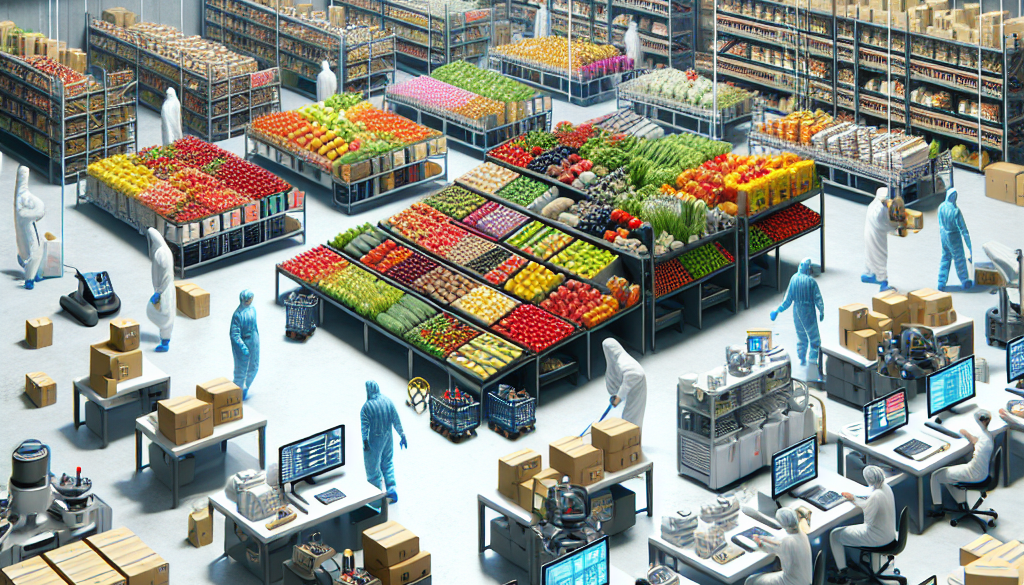Building an Agile Food Supply Chain Amidst COVID-19
Table of Contents
- Agile Food Supply Chain Strategies During COVID-19
- Understanding the Impact of COVID-19 on Food Supply Chains
- Key Strategies for Building an Agile Food Supply Chain
- Enhancing Supply Chain Visibility
- Diversifying Suppliers and Distribution Networks
- Adopting Flexible Production Techniques
- Strengthening Relationships with Stakeholders
- Investing in Workforce Management
- Case Studies: Agile Responses to COVID-19
- Statistics Highlighting the Need for Agility
- Conclusion: Embracing Agility for Future Resilience
- ETprotein: Your Partner for Agile Food Supply Solutions
Agile Food Supply Chain Strategies During COVID-19
The COVID-19 pandemic has posed unprecedented challenges to global food supply chains. Disruptions due to lockdowns, labor shortages, and fluctuating demand have forced the industry to rethink and restructure their operations. Building an agile food supply chain has become a necessity to ensure resilience and continuity in the face of such challenges. This article explores the strategies and practices that can help create a more flexible and responsive food supply chain during and beyond the pandemic.
Understanding the Impact of COVID-19 on Food Supply Chains
The pandemic has highlighted several vulnerabilities within the food supply chain. Key issues include:
- Disruptions in transportation and logistics due to travel restrictions.
- Shifts in consumer demand from foodservice to retail.
- Labor shortages in production, processing, and distribution.
- Increased health and safety concerns affecting operations.
These challenges have underscored the need for supply chains to become more agile, adaptable, and resilient.
Key Strategies for Building an Agile Food Supply Chain
To address the complexities introduced by the pandemic, several strategies have been identified:
Enhancing Supply Chain Visibility
Real-time data and analytics are crucial for making informed decisions quickly. Investing in technologies like IoT, blockchain, and AI can provide insights into every stage of the supply chain, allowing for better risk management and response strategies.
Diversifying Suppliers and Distribution Networks
Reliance on a single supplier or distribution channel can be risky. Companies are now looking to diversify their sources and logistics options to reduce potential disruptions.
Adopting Flexible Production Techniques
Flexible manufacturing systems that can quickly pivot based on changing demands are essential. This might include modular equipment or processes that can be easily scaled up or down.
Strengthening Relationships with Stakeholders
Collaboration across the supply chain, including suppliers, distributors, and customers, can lead to more cohesive and coordinated responses to disruptions.
Investing in Workforce Management
Ensuring the safety and availability of workers is critical. This includes adopting health protocols, providing support for remote work where possible, and cross-training employees.
Case Studies: Agile Responses to COVID-19
Several companies have successfully adapted their supply chains in response to the pandemic:
- A major retailer implemented AI-driven forecasting tools to better predict demand spikes and adjust inventory accordingly.
- A global food producer diversified its supplier base, reducing dependency on any single region or supplier.
- A logistics company used blockchain to enhance traceability and transparency throughout its supply chain.
These examples demonstrate the effectiveness of agile strategies in mitigating the impact of COVID-19 on food supply chains.
Statistics Highlighting the Need for Agility
Recent statistics underscore the importance of agility in the food supply chain:
- According to a survey by McKinsey, 93% of supply chain executives plan to increase resilience across the supply chain.
- A study by PwC found that companies with high supply chain agility experienced a 3x faster growth rate compared to their peers.
These figures highlight the tangible benefits of adopting agile practices.
Conclusion: Embracing Agility for Future Resilience
The COVID-19 pandemic has served as a wake-up call for the food industry to build more agile and resilient supply chains. By enhancing visibility, diversifying networks, adopting flexible production, strengthening stakeholder relationships, and investing in workforce management, companies can better navigate current and future disruptions. The successful case studies and compelling statistics provide a roadmap for other businesses looking to adapt and thrive in a post-pandemic world.
ETprotein: Your Partner for Agile Food Supply Solutions
In the context of building an agile food supply chain, ETprotein’s protein products offer a reliable and high-quality option for businesses looking to enhance their product offerings. Their range of organic bulk vegan proteins and L-(+)-Ergothioneine (EGT) can help companies diversify their product lines and meet the evolving demands of health-conscious consumers.
ETprotein’s commitment to non-GMO, allergen-free, and high-purity ingredients ensures that their products are suitable for a wide array of applications, from nutraceuticals to infant formula. By partnering with ETprotein, companies can secure a consistent supply of premium protein products, contributing to a more agile and resilient food supply chain.
About ETprotein: ETprotein, a reputable protein and L-(+)-Ergothioneine (EGT) Chinese factory manufacturer and supplier, is renowned for producing, stocking, exporting, and delivering the highest quality organic bulk vegan proteins and L-(+)-Ergothioneine. They include Organic rice protein, clear rice protein, pea protein, clear pea protein, watermelon seed protein, pumpkin seed protein, sunflower seed protein, mung bean protein, peanut protein, and L-(+)-Ergothioneine EGT Pharmaceutical grade, L-(+)-Ergothioneine EGT food grade, L-(+)-Ergothioneine EGT cosmetic grade, L-(+)-Ergothioneine EGT reference grade and L-(+)-Ergothioneine EGT standard. Their offerings, characterized by a neutral taste, non-GMO, allergen-free attributes, with L-(+)-Ergothioneine purity over 98%, 99%, cater to a diverse range of industries. They serve nutraceutical, pharmaceutical, cosmeceutical, veterinary, as well as food and beverage finished product distributors, traders, and manufacturers across Europe, USA, Canada, Australia, Thailand, Japan, Korea, Brazil, and Chile, among others. ETprotein specialization includes exporting and delivering tailor-made protein powder and finished nutritional supplements. Their extensive product range covers sectors like Food and Beverage, Sports Nutrition, Weight Management, Dietary Supplements, Health and Wellness Products, and Infant Formula, ensuring comprehensive solutions to meet all your protein needs. As a trusted company by leading global food and beverage brands and Fortune 500 companies, ETprotein reinforces China’s reputation in the global arena. For more information or to sample their products, please contact them and email sales(at)ETprotein.com today.












